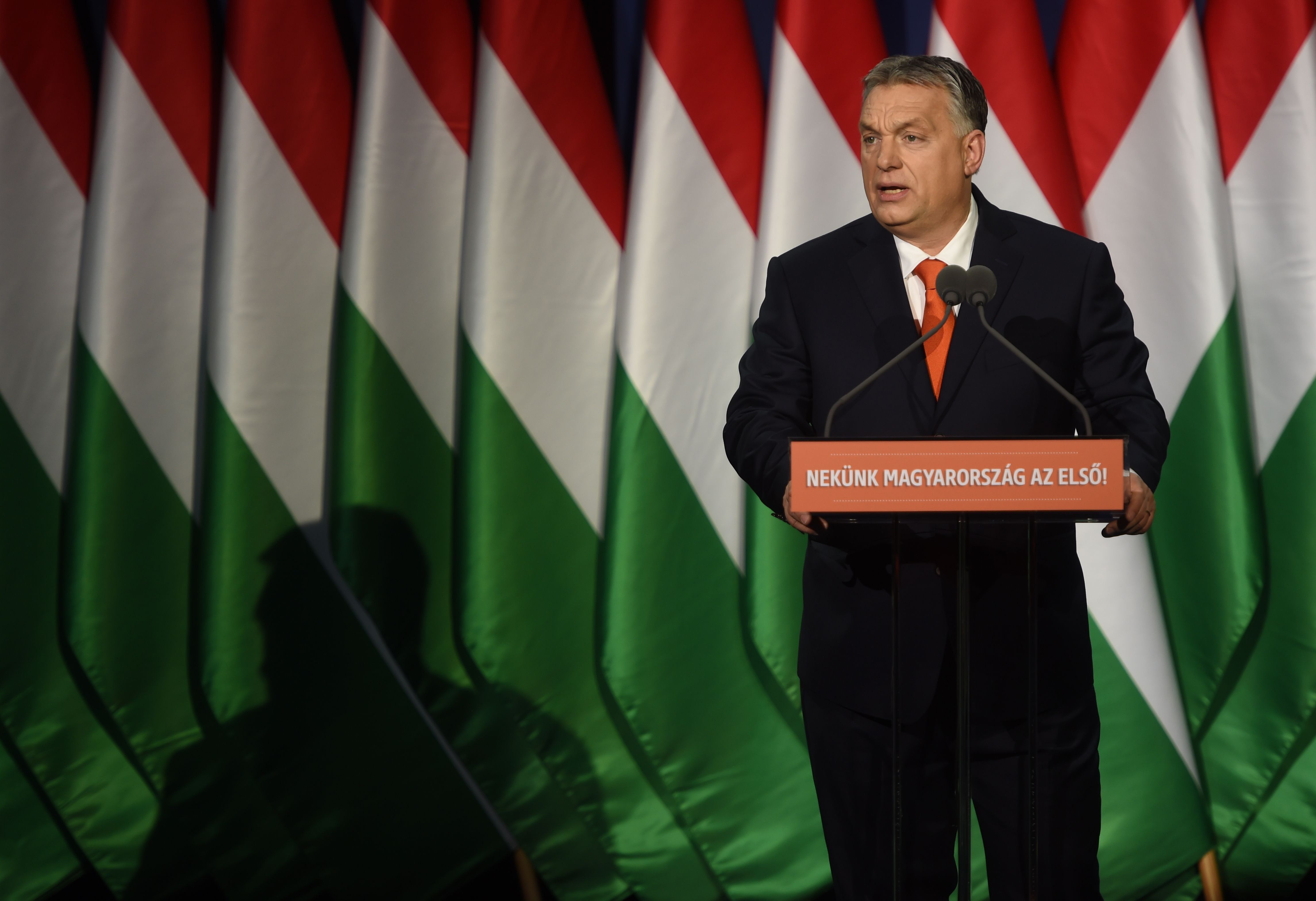On 8 April Hungarians will go to the polls to elect a new parliament (Országgyülés). Support for Viktor Orbán’s ruling Fidesz party has declined considerably in comparison to the last election. Nevertheless, Fidesz is expected to win the elections and form the next government.
In the run-up to the elections Hungary’s government is under pressure. Protests against education policies and corruption allegations against several confidants of Prime Minister Viktor Orbán have dominated the news. Among them is Orbán’s son-in-law whose former company was very successful on EU-funded tenders for public lighting projects but is now mentioned in a report by the EU’s anti-fraud office OLAF. A lost mayoral election in a former Fidesz party stronghold in the small town of Hódmezövásárhely in February 2018 as well as current opinion polls suggest that the ruling coalition made up of national conservative Fidesz and its junior partner, the Christian-Democratic People’s Party (KDNP), has waned in popularity, with many voters remaining undecided one month prior to elections.
In response to growing pressure, the government is implementing various measures to boost its popularity in the current election campaign, including pre-election handouts. At the end of last year, millions of pensioners received vouchers worth 10,000 forints (equivalent to approx. 32 euros). On top of this, the government announced it would send out more vouchers as an “Easter gift” – to be distributed by 29 March. The reduction of public utility charges has also been a focus of the election campaign. The government decided to remit part of the heating costs, which had increased due to the cold winter. Pay-out date was 23 March.
The EU pays, Brussels interferes
In addition to election handouts, coupled with positive messages about the government’s performance, Fidesz has also been running a negative election campaign. Particularly prominent issues include, first of all, relations with the European Union, and secondly the role of Hungarian-born billionaire Georg Soros. Both topics are also linked to the migration issue.

Michael Ignatieff, President and Rector of the Central European University (CEU), welcomes George Soros (right) on his first visit to the new campus in Budapest in 2016. Photo: © CEU/Tuba Zoltan (Kepszerkesztoseg)
Hungary is at odds with the EU on a range of issues. Over the past few years, the EU has initiated several infringement proceedings against Hungary, following changes to the law on higher education (commonly also known as “Lex-CEU”) and regarding restrictive NGO legislation, among other things. On the other hand, the Hungarian government feels it has been treated unjustly by the EU Commission and is displeased about interference in its internal affairs. Hungary shares this perception with other East-Central European states, which after decades of subordination to Moscow are now refusing to accept any supposed limitation of their sovereignty. Barely a week goes by without news reports of the Hungarian government refusing to tolerate interference “from Brussels”. In early 2017 the country’s relations with the EU were even subject of a national consultation dubbed “Let’s stop Brussels”. The propositions put to the vote included migration policy issues, utility prices, taxes and the work of NGOs. Most of these topics are also part of the 2018 parliamentary election campaign.
Despite all resistance, it is striking that political leaders are somewhat restrained in their offensive against the EU itself, rather targeting bureaucratic “Brussels” with their criticism. We can only speculate about the reasons behind this. Most Hungarians are certainly perfectly aware that the prosperity they enjoy is partly owed to EU membership. Hundreds of thousands of them work in other European countries. According to the Eurobarometer survey, most Hungarians have confidence in the EU. As an overly offensive anti-EU campaign would not be popular under these circumstances, campaigners apparently draw a discursive distinction between the EU (gives money) and Brussels (interferes).

A billboard shows Hungarian-American billionaire and philanthropist George Soros. A central element of the election campaign is the multi-media campaign launched against him and a so-called “Soros Plan”, which is allegedly supporting mass immigration into the EU. Photo: © Attila Kisbenedek / AFP / picturedesk.com
A central element of the election campaign is the multi-media campaign launched against Georg Soros. For months the government has been putting up posters against a so-called “Soros Plan”, which is allegedly supporting mass immigration into the EU. This “plan” was the subject of another national consultation in late 2017, which was accompanied by an incessant billboard campaign (“Let’s not let Soros have the last laugh”). Laws that hamper the work of organisations involved in refugee aid are also justified with the fight against the “Soros Plan”.
Fragmented opposition
Despite the current critical sentiment among the population, Fidesz has a very good chance of winning the elections. This is due to the mixed electoral system that leans more towards a majority voting system on the one hand and the lack of a real alternative on the other.
Since 2011 Hungary has had a mixed electoral system that rather tends towards a majority voting system: 106 of the 199 mandates are directly elected to single-member constituencies; a relative majority during the first round of voting is enough to win. The remaining 93 seats are awarded to party lists or lists of national minorities; distribution of the seats is calculated by the D’Hondt method. Party lists must get at least five percent of the votes cast in order to be considered. The electoral law occasionally has severely distortive effects. In the 2014 elections Fidesz won 96 direct mandates and together with the candidates from the party list vote managed to garner two thirds of the parliamentary seats – despite receiving just under 45 percent of the party list vote. Due to the larger proportion of parliamentary seats allocated by direct mandate, it is more difficult to make projections of the distribution of seats.

Viktor Orbán, Prime Minister of Hungary. Photo: © Attila Kisbenedek/AFP/picturedesk.com
It is evident, however, that none of the opposition parties is able to even come close to receiving as many votes as Fidesz. The opposition’s only chance of winning a significant number of parliamentary seats is for the various small parties to unite consistently and win direct mandates. The election law is unfavourable to joint party lists: a joint list of two parties raises the election threshold to ten percent, a list of more than two parties to 15 percent. Due to the proportional increase of the election threshold, the alliance of smaller parties does not increase the likelihood of party list positions. Parties thus do not benefit from alliances for strategic electoral reasons.
However, there is an initiative from among the opposition suggesting that all opposition parties support one joint candidate in each constituency while the other parties withdraw their respective candidates. One proponent of this strategy is Gergely Karácsony, chairman of a small party called “Dialogue for Hungary”. For this strategy to be successful left-wing parties would have to cooperate with the far-right Jobbik party. Although Jobbik is currently moving towards the centre, trying to turn into a more mainstream force than in the past, ideological divides are deep and there is no widespread support for cooperation.

Left and right-wing political sympathisers hold torches and Jobbik party flags during an anti-government protest organised by the opposition party Jobbik against Hungarian Prime Minister Viktor Orbán and the governing Fidesz party in front of Fidesz headquarters in Budapest on 15 December 2017. Photo: © Attila Kisbenedek/AFP/picturedesk.com
As a result, the opposition is facing a hardly surmountable dilemma. Under these circumstances it is likely that the 27 to 49 percent of voters who support the Fidesz-KDNP coalition according to current opinion polls will be enough to uphold the government majority. Yet the government has little reason to expect to retain the comfortable two-thirds majority it held in 2014. For the time being, Orbán and his Fidesz benefit from the opposition’s sustained weakness. However, recent years have seen the formation of a number of new parties and individuals that have distinguished themselves that could change political events in future. There is also evidence of erosion within the party, the most prominent example being a former classmate and long-time companion of Orbán, millionaire Lajos Simicska, who has been campaigning against his former allies following a disagreement a year ago and is supporting Jobbik in the current election campaign.
Additionally, the first signs of eroding support for Fidesz are appearing in the current election campaign. After eight years in powerFor Orbán, who first served as Prime Minister from 1998 to 2002, this would be his fourth term in office. the party is vulnerable to criticism from the left and right and can no longer credibly present itself as an “outsider”. If the current rash of scandals continues, the present discontent among large groups of voters with Orbán’s style of governing could lead to stronger mobilisation of the population in the medium term.
Original in German. First published on 29 March 2018 on Eastblog (Blog of the research group for Eastern Europe at the Department of Political Science of the University of Vienna) and on 30 March 2018 on derstandard.at.
Translated into English by Barbara Maya.
This text is protected by copyright: © Esther Somfalvy. If you are interested in republication, please contact the editorial team.
Copyright information on pictures, graphics and videos are noted directly at the illustrations. Cover picture: Budapest panorama, view on the Chain Bridge over the river Danube, and Parliament Buildings. Photo: © iStock/piccaya.